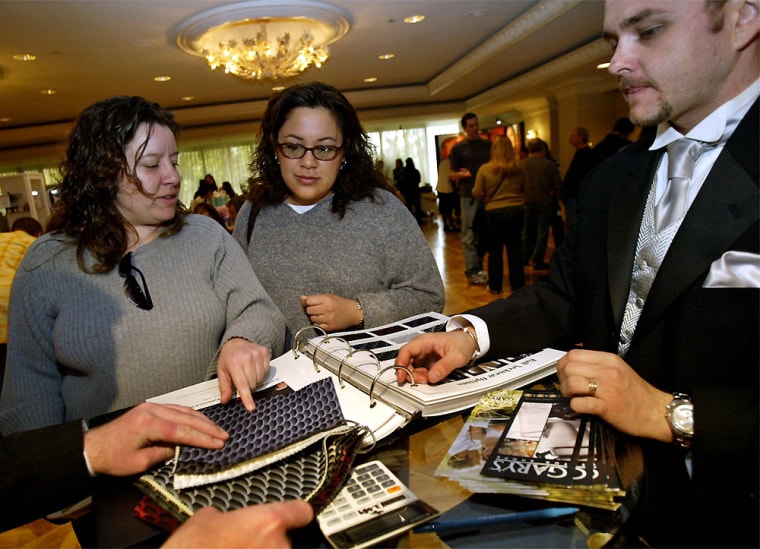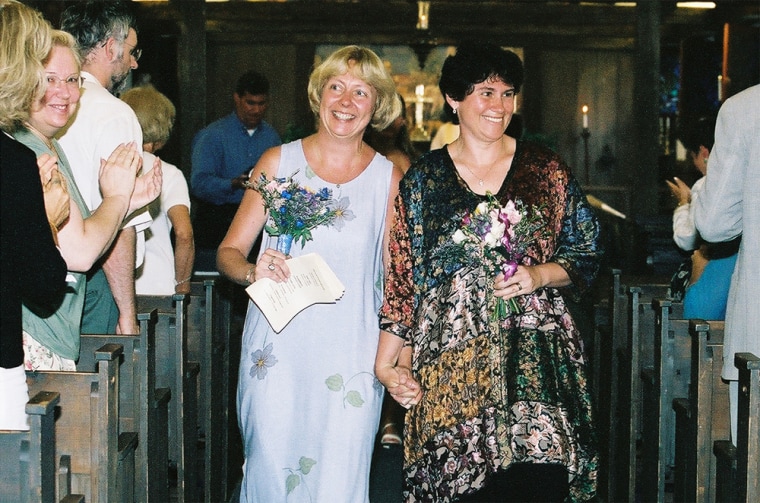If you think it’s daunting to plan your wedding, imagine the logistics for this lesbian couple:
One of the partners is Protestant and wants her hometown minister to officiate part of the ceremony, which will take place in her current home, Vancouver, B.C. But the minister is not licensed to officiate in Vancouver, one of the places in Canada where same-sex weddings are now legal, so a Vancouver marriage commissioner also must be present for the ceremony, scheduled to start at 5 p.m. on a Saturday.
The other partner is Jewish and wants part of the ceremony to follow her tradition. But the rabbi licensed in Vancouver who is willing to officiate at gay and lesbian weddings won’t do so unless both partners are Jewish. An alternative rabbi will come to town to handle that part of the ceremony. However, he won’t be able to officiate until after sunset, which marks the end of the Jewish Sabbath.
Thus, this portion of the ceremony, to be in Yiddish and English under a specially ordered rainbow-colored “chupah,” will start shortly after 9:30 p.m. Somewhere along the line, there will be dinner, cocktails and a Motown band playing.
In the process of determining a guest list — one of the most difficult chores, made more so by sensitivities about same-sex marriage — the couple also considered dividing up who was invited to attend which part of the festivities, in part because of religious sensitivities.
"I think — I hope — we have talked them out of this," says Vancouver wedding consultant Taylore Darnel, who with a partner runs Belles & Balls Extraordinary Weddings & Events. "If they try (to go through with it), someone's nose is sure to get out of joint."
She says it's the most challenging wedding she has handled in her 15 years in events planning. “It’s a real juggling act.”
But Darnel and other wedding consultants are quick to say there are rewards in the business — monetary and emotional. A series of moves toward legalizing same-sex marriage in the United States, and just across the border, have sparked a new wave of couples planning to publicly tie the knot.
New boom
"The boom is just beginning," says Desiree Hargrave, whose company The Other Side Enterprises started producing the annual Los Angeles Gay and Lesbian Wedding Expo last year. Hargrave said interest in the market started to percolate in 2000 when Vermont passed a law legalizing civil unions for same-sex couples.
The first gay wedding expo took place in New York in 2001, says Hargrave. The Los Angeles event came next. This year there are at least six cities hosting wedding shows geared to same-sex couples. The trend seems to be solidly under way, even as opponents of gay and lesbian marriages threaten to reverse legalization of these unions.
The L.A. event, held Feb. 22, drew about 2,000 visitors this year, roughly double attendance last year, Hargrave says. Meanwhile, the number of vendors interested in getting in on this show, and the emerging market, exploded. The organizers had space for 42 vendors — flogging everything from formalwear, photography and honeymoon travel packages to real estate and financial and mortgage services. But at least 100 vendors from all over the country applied to take part, she says, and many had to be turned away.
Part of the interest was generated through more advertising, says Hargrave. "But I wouldn't discount the impact of what happened in San Francisco two weeks before the expo," she says. On Feb. 12, San Francisco Mayor Gavin Newsom threw open the gates to same-sex marriage, despite a state law that defines marriage as a union between one man and one woman. More than 3,700 couples have tied the knot at San Francisco's City Hall in the past month.
The scene was historic, and certainly exciting for couples who have long waited for legal seal of approval of their relationships — and the benefits that go along with being married. But for many, the chance to plan a "real wedding" to go with the marriage certificate came only after the fact.
But for many this legal ceremony simply marked the start down the path toward a “real wedding” that will come together only after months or years of planning and at the cost of many thousands of dollars.
New twists on tradition
To be sure, there are cheesy and cheap options out there for same-sex couples, as there are for heterosexual couples, like the Gay Chapel of Las Vegas, which can provide an array of exotic themes.
The Intergalactic wedding ceremony, for instance is "presided over by Captain James T. Quirk or Captain Schpock, in the Starship Chapel." The "Wassup Pussycat" ceremony is billed as an event "filled with the sexy and fun music of Tom Jones," including theatrical lighting and fog.
At the high end are celebrity weddings like that of rocker Melissa Etheridge and actress Tammy Lynn Michaels, who were married at the Malibu seaside home of Dick Clark in August last year. Their "private" wedding had a guest list of 150 including Tom Hanks, Al and Tipper Gore, Sheryl Crow, Steven Spielberg and Jennifer Aniston — while uninvited gossip columnists and reporters hovered overhead in helicopters.
But based on what has emerged over the past decade — in marriage-like commitment ceremonies and civil-union ceremonies — many same-sex couples won't deviate all that much from traditional rites seen in straight weddings.
"There are very few things that really differ," says Ariane Taylor, whose company Avante Bride provides planning services for same-sex couples in the Boston area. "Obviously, there's no option of a traditional Catholic Mass," she says. "But you can still put elements of a Mass in there — things like unity candles."
Still, the logistics can be tricky for same-sex couples in a world where their lifestyles are not accepted across the board. One of the most important services provided by Darnel's Vancouver company Belles & Balls is confidentiality, says Darnel. The company has been planning commitment ceremonies for more than a decade and now is handling legal same-sex weddings, about 70 percent of them for American clients.
"Many people are not out at their workplaces or to their family," she says. "The fact that they can come to us … and they don’t have to out themselves to the caterers, jewelers, limo companies, tuxedo providers. We plan absolutely everything for the wedding."
To some extent, wedding planners act as a buffer between the couple, creating lists of gay- and lesbian-friendly vendors through extensive interviews with caterers, restaurants and florists. Darnel says that for her company that even includes interviews with restaurant staff and limo drivers who will be on duty for the wedding party to assure that there are no awkward moments. "This is their wedding day," she says. "There's no room for disrespect."
Indeed, in Toronto, where same-sex marriages are also legal, planners reportedly even created a "gay for pay" blacklist — of vendors and venues such as country clubs that were previously hostile to same-sex events, but have since jumped on the bandwagon. Some in the industry would like to ensure that these mercenaries are not getting profits.
As in all weddings, family logistics are often the most difficult. Who should be invited, who should enter the ceremony with the brides or grooms, who should take part in the ceremony and then where should everyone sit. One tradition, dividing seating for friends and family of each partner into sides is often abandoned, particularly if one partner is estranged from family and friends because of sexual preference.
The process is getting easier by the year. When Tess Ayers wrote the first edition of “The Essential Guide to Lesbian and Gay Weddings” a decade ago, the book dealt with how to approach your family with news that not only were you gay, but also that you were getting married. "Getting married was radical," says Ayers. Ayers was a pioneer: She and her partner had their own commitment ceremony a decade ago.
But the shock may be minimal these days. "The conversation is being held around the country, and you’d have to have your head in the sand not to know what’s going on," she says.
Icing on the cake
While many companies in the wedding industry are now tailoring their services and products to accommodate, there are also new niche companies emerging. Occupying a truly obscure niche, one vendor who sells custom-made brooms saw her sales explode at the Los Angeles gay and lesbian wedding expo, according to Hargrave of Other Side Enterprises.
"Jumping over the broom" — a custom associated with African-American slave culture — has been increasingly popular in same-sex weddings, because it signifies marriage in conditions where it is prohibited.

The Internet also makes it easier for customers and niche businesses to link up.
Commitment Ceremony Custom Caketop allows customers to order on-line wedding-cake figurines, each with a specified gender, skin color and hair color.
"When we first wrote (“The Essential Guide”), if you were living in Des Moines and you wanted two brides as cake-toppers, good luck," says author Ayers. "Now all you have to do is a Google search."
Despite the remaining challenges, the payoffs are real for planners and vendors. For one thing, same-sex couples generally spend more money per guest than their heterosexual counterparts. "A lot of these people are older than the typical blushing bride," says Darnel of Belles & Balls. "They have been together a long time, have money put by."
She estimates that the usual outlay by the couple is as much as 50 percent more than that of straight couples, per guest. At the high end are American clients, who often pay for guests' accommodations and travel to Canada for ceremonies.
"People probably spend more than heterosexual couples, relative to their means," agrees Ayers. "They tend to go a little overboard because it was never expected that it would happen. Everybody wants to do it up big."
Another thing that people in the industry seem to agree on is that the emotional intensity of same-sex weddings simply trumps that at most straight weddings. Many of the couples have been together for many years, perhaps only now feeling free to hold a public ceremony or take advantage of new legal openings.
"The import — that this is actually happening — between these people who have waited so long, seems to add that emotion. It means so much," says Darnel. "We always have a box of Kleenex with us."
